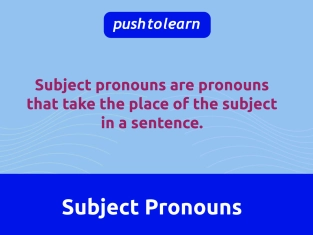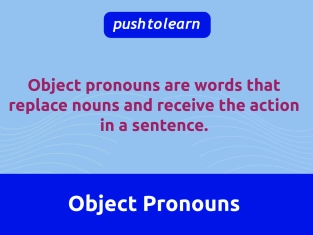by PushtoLearn
List of Pronouns in English
Table of Contents
Pronouns - Exercises
These exercises focus on pronouns
What Are Pronouns?
A pronoun is a word that takes the place of a noun. For example:
✔ Without a pronoun:
-
Lisa is a teacher. Lisa loves her students.
✔ With a pronoun:
-
Lisa is a teacher. She loves her students.
Pronouns help make sentences shorter and easier to understand.

Types of Pronouns (With Examples)
Here is a pronouns table that categorizes all English pronouns:
|
Type |
Pronouns List |
Examples |
|
I, you, he, she, it, we, they |
She is my friend. |
|
|
me, you, him, her, it, us, them |
They gave it to me. |
|
|
mine, yours, his, hers, its, ours, theirs |
This book is mine. |
|
|
myself, yourself, himself, herself, itself, ourselves, yourselves, themselves |
I did it myself. |
|
|
this, that, these, those |
This is my car. |
|
|
Interrogative Pronouns |
who, whom, whose, which, what |
What is your name? |
|
Relative Pronouns |
who, whom, whose, which, that |
The man who called you is my brother. |
|
someone, anyone, nobody, everything, both, few, many |
Someone is at the door. |
|
|
Reciprocal Pronouns |
each other, one another |
They love each other. |
Personal Pronouns (Subject & Object)
Personal pronouns are divided into subject and object forms.
✔ Subject Pronouns: Used as the subject of a sentence.
✔ Object Pronouns: Used as the object of a verb or preposition.
|
Subject Pronoun |
Object Pronoun |
Example Sentence |
|
I |
me |
I love chocolate. / She gave me a gift. |
|
You |
you |
You are my best friend. / I called you yesterday. |
|
He |
him |
He is a doctor. / I saw him at the mall. |
|
She |
her |
She likes coffee. / Give her the book. |
|
It |
it |
It is raining. / I found it on the table. |
|
We |
us |
We are going home. / They invited us to the party. |
|
They |
them |
They are my classmates. / I met them at school. |
Possessive Pronouns
Possessive pronouns show ownership and replace possessive nouns.
|
Possessive Adjective |
Possessive Pronoun |
Example Sentence |
|
my |
mine |
This is my bag. → This bag is mine. |
|
your |
yours |
Is this your book? → Is this book yours? |
|
his |
his |
This is his jacket. → This jacket is his. |
|
her |
hers |
That is her house. → That house is hers. |
|
its |
its |
The cat loves its toy. (No possessive pronoun for "it") |
|
our |
ours |
This is our classroom. → This classroom is ours. |
|
their |
theirs |
That is their car. → That car is theirs. |
✅ Key rule: Possessive pronouns never need a noun after them.
❌ This is mine book.
✅ This book is mine.
Reflexive Pronouns
Reflexive pronouns refer back to the subject of the sentence.
|
Pronoun |
Example Sentence |
|
myself |
I cut myself while cooking. |
|
yourself |
Did you enjoy yourself? |
|
himself |
He hurt himself playing football. |
|
herself |
She made the dress herself. |
|
itself |
The dog scratched itself. |
|
ourselves |
We enjoyed ourselves at the party. |
|
yourselves |
You should introduce yourselves. |
|
themselves |
They built the house themselves. |
❌ Common Mistake: He looked at him in the mirror. (Incorrect)
✅ Correct: He looked at himself in the mirror.
Demonstrative Pronouns
Demonstrative pronouns point to specific things.
|
Singular |
Plural |
Example Sentence |
|
this |
these |
This is my book. / These are my books. |
|
that |
those |
That is your pen. / Those are your pens. |
✔ "This" and "these" refer to nearby things.
✔ "That" and "those" refer to farther things.
Interrogative Pronouns
Interrogative pronouns ask questions.
|
Pronoun |
Example Sentence |
|
who |
Who is calling? |
|
whom |
Whom did you invite? |
|
whose |
Whose bag is this? |
|
which |
Which dress do you like? |
|
what |
What is your favorite color? |
Relative Pronouns
Relative pronouns introduce relative clauses to give more information about a noun.
|
Pronoun |
Example Sentence |
|
who |
The teacher who helped me was kind. |
|
whom |
The woman whom I met was nice. |
|
whose |
The boy whose bike was stolen is sad. |
|
which |
The book which you lent me is interesting. |
|
that |
The dress that she wore was beautiful. |
Indefinite Pronouns
Indefinite pronouns refer to unspecified people or things.
|
People |
Things |
|
someone, anyone, no one, everyone |
something, anything, nothing, everything |
|
somebody, anybody, nobody, everybody |
✔ Examples:
-
Someone is knocking on the door.
-
I don’t have anything to eat.
Reciprocal Pronouns
Reciprocal pronouns show mutual actions between people.
|
Pronoun |
Example Sentence |
|
each other |
They love each other. |
|
one another |
The two teams respect one another. |
✔ Use "each other" for two people.
✔ Use "one another" for more than two people.
FAQs about Pronouns
What are the types of pronouns?
There are 8 types of pronouns: personal, possessive, reflexive, demonstrative, interrogative, relative, indefinite, and reciprocal pronouns.
What is a list of all pronouns in English?
The pronouns list includes: I, you, he, she, it, we, they, me, him, her, us, them, mine, yours, his, hers, its, ours, theirs, myself, yourself, himself, herself, itself, ourselves, yourselves, themselves, this, that, these, those, who, whom, whose, which, what, someone, anyone, nobody, everybody, each other, one another.
Is "they themselves" grammatically correct?
Yes! Example: They themselves completed the project.

